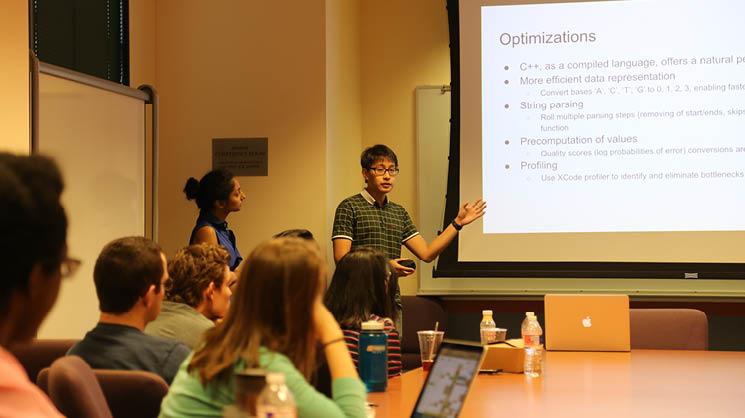A diverse group of eleven undergraduates eager for “cross-training” took part in the 2018 Rice University Data Science Summer Program (RUDSSP).
The program aims to increase diversity in STEM fields while providing an opportunity for computer science (CS) and statistics (STAT) majors to learn from each other through university research.
“Our goal is to pair up graduate and undergraduate students and give everyone a chance to do work together,” said Risa Myers ‘16, a lecturer in computer science who helped administer the program. “We wanted to give undergraduates a chance to work on real-world problems that people are interested in.”
The students worked on three projects proposed by NASA Johnson Space Center, and two from researchers at Rice. Matt Koslovsky, the Rice postdoctoral research associate in data science who coordinated the NASA-based projects, said training across disciplines is essential to career success.
“In data science, you have to be well-rounded; you have to have a broad spectrum of skills,” he said.
The diverse set of projects included detecting “fake news” and trying to replicate controversial results from a recently published scientific paper. The students evaluated the methodology and investigated whether or not the published findings were sensitive to the authors' analytical pipeline.
“They found some things the researchers did that were on point and used appropriate methods, and some that could have used more investigation,” Koslovsky said.
“This was my first real chance to work with undergrads since being a teaching assistant,” Myers said, “and I was impressed. It was amazing to see them hit the ground running and tackle difficult concepts. A lot had new domains to learn, and a lot of projects were bioinformatics-focused, which is not easy material to pick up.”
Koslovsky echoed her sentiments: “It’s amazing to see what this generation of scientists can do. At that age, to do the work they are doing and absorb all the skill sets required is impressive.”
Koslovsky lauded the program as a chance to strengthen collaborations between Rice and the greater Houston community and stressed that NASA also benefited. They were able to hand off projects to budding experts, permitting researchers at the Space Center to focus on other challenges.
“NASA is excited and will carry forward some of the work the students accomplished over the summer,” he added.
Myers encourages students interested in research to apply for the summer 2019 program. Applications are expected to open in March.
“Publishing before graduate school is increasingly important,” she said. “This is a chance to dip your toe in and learn what research is about.”
Funding came from a National Science Foundation grant, for which Marina Vannucci, Noah Harding Professor and chair of STAT, and Luay Nakhleh, J.S. Abercrombie Professor of CS and department chair of CS, are co-PI’s, and from Two Sigma and the Provost’s office at Rice.
Jennifer Hunter and Patrick Kurp, Engineering Communications

